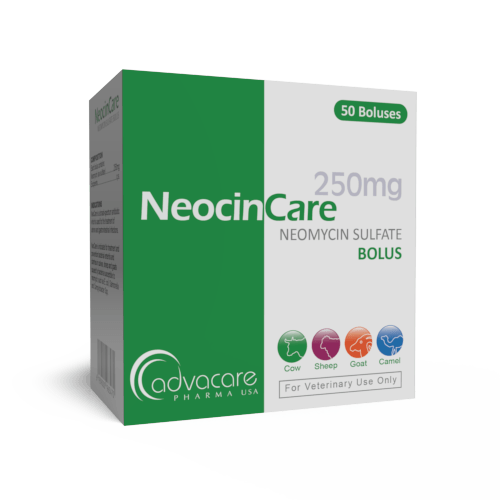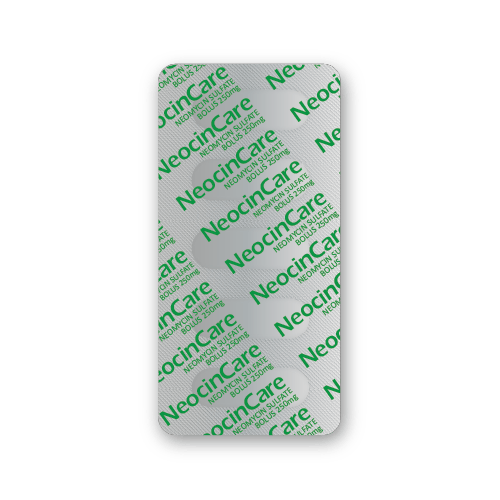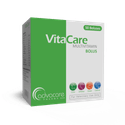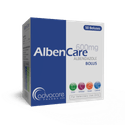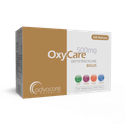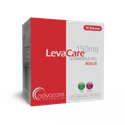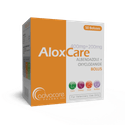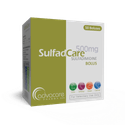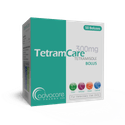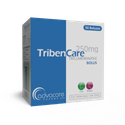- Home›
- Veterinary Pharmaceuticals›
- Veterinary Boluses›
- Neomycin Sulfate Boluses
Neomycin Sulfate Boluses
Dosage
Packaging
What is Neomycin Sulfate?
Active Ingredients: Neomycin Sulfate
Neomycin Sulfate Boluses are an antibiotic drug used to treat or control bacterial enteritis in livestock animals like camels, cows, sheep, and goats. It is an effective treatment for colibacillosis caused by susceptible strains of E. coli and other gastrointestinal infections, including specific and nonspecific diarrhea.
Like all antibiotics, Neomycin Sulfate is not effective against fungal or viral infections, and many cases of scour in calves are due to viral infections.
This antibiotic exerts a bactericidal effect, actively eliminating pathogens, especially those that reproduce rapidly, through diverse mechanisms. The primary action of the antibiotic takes place at the bacterial ribosome, associated with the membrane, disrupting protein synthesis. This bactericidal effect is swiftly achieved upon brief contact with bacteria. Initially, the antibiotic disrupts the lipopolysaccharide through active cell transport.
Gastrointestinal absorption is limited, being less than 10%, with increased permeability in neonates and individuals with enteritis. Optimal absorption occurs through intramuscular administration, reaching peak concentrations in the blood within 30-90 minutes. For safety precautions, it is recommended for once-daily injections.
While its distribution in extracellular fluids is restricted, except for the kidneys and inner ear, conditions such as dehydration and sepsis can augment distribution. However, Neomycin does not penetrate the cerebrospinal fluid, milk, ocular fluids, intestinal fluids, or prostatic secretions. The antibiotic is excreted unchanged through urine via glomerular filtration, typically within 24 hours of administration. Elimination is contingent on factors like cardiovascular function, age, fever, renal function, and other individual considerations.
Neomycin Sulfate is classified as an aminoglycoside antibiotic. This antibiotic shows activity against both gram-positive and gram-negative bacteria, including Staphylococci, E. coli, Haemophilus influenza, and many strains of Proteus and Pseudomonas.
This antibiotic is also available in combination with Penicillin G Procaine (suspension for injection).
AdvaCare Pharma is a trusted global exporter of Neomycin Sulfate Boluses and many other veterinary medications. We strive to offer the highest quality products to distributors and veterinary professionals. Our reliable, cost-effective livestock medications are manufactured under strict GMP guidelines.
Why are we a top Neomycin manufacturer?
AdvaCare Pharma is an American-owned and operated company specializing in the manufacture of veterinary medicines. As part of our range of 250+ veterinary formulations, we manufacture Neomycin Boluses under strict GMP guidelines, ensuring efficacy. Our veterinary distributors have confidence in the quality of our products, making AdvaCare Pharma a leading bolus manufacturer and supplier to countries where dependable, cost-effective livestock medications are in high demand.
Uses
What is Neomycin Sulfate used for?
It's used to treat and control gastrointestinal infections, including bacterial enteritis and scours in calves, kids, and lambs.
What animals can be treated with Neomycin Sulfate Bolus?
It's recommended for livestock animals like camels, cows, ѕhеер, and gоаtѕ.
How can Neomycin Sulfate Boluses help animals?
Targeting gram-negative organisms such as E. coli, Salmonella, Klebsiella, Enterobacter, Proteus, and Acinetobacter spp., this antibiotic may necessitate a combined approach with other antimicrobials. This strategy enables the utilization of aminoglycosides at lower doses.
How can Neomycin Sulfate Boluses help in bacterial pneumonia in animals?
Pasteurella multocida, Mannheimia haemolytica serotype 1, and Histophilus somni are causative agents of bacterial pneumonia. This antibiotic effectively addresses upper respiratory tract symptoms in animals, reducing serous to mucopurulent nasal discharge and alleviating moist cough, particularly in cattle. Normalization of respiratory rate and auscultation is observed post-treatment, with no discernible bronchial sounds, crackles, or wheezes. Animals regain normal breathing patterns.
The successful management of bacterial pneumonia involves the application of appropriate broad-spectrum antimicrobials. Aminoglycosides are commonly chosen as first- or second-line treatments for cattle, contingent on antibiogram results and the animal's health status. Additional medications may be required for a complete recovery, and many veterinarians recommend NSAIDs to control bacterial pneumonia in animals.
How can Neomycin Sulfate Boluses help in treating enteritis in animals?
Neomycin Sulfate Bolus is capable of mitigating symptoms associated with gastrointestinal infections, such as vomiting, diarrhea, and stomach discomfort. Its primary efficacy is notable in the treatment of E. coli gastrointestinal infections; however, it exhibits a broad spectrum and is effective against various other bacteria. The selection of the most suitable antibiotic should be guided by antibiogram results. For animals experiencing enteritis, it is advisable to provide supplementation with probiotics, vitamins, and minerals to restore and maintain a balanced gut flora.
Is only Neomycin Sulfate Bolus enough for treating diseases?
This is contingent on the current health status of the animal. In instances of respiratory ailments, identifying the specific cause is crucial. Utilizing an antibiogram can aid in determining the suitability of this antibiotic as a treatment option. Some animals may require supplementary therapies such as corticosteroids, intravenous fluids, or vitamin supplements.
For cases involving gastrointestinal infections, the antibiotic's broad spectrum makes it effective against a range of bacteria. Ensuring animals receive a well-balanced diet is essential for restoring normal gut flora. Additionally, animals facing gastrointestinal infections may benefit from supplements like probiotics and vitamins. In situations of urinary infections, the veterinarian should evaluate the appropriateness of using this antibiotic, with the decision guided by antibiogram results.
Can Neomycin Sulfate Boluses help in treating mastitis?
Mastitis is a prevalent and economically impactful disease in cows, leading to a reduction in milk production. Staphylococcus aureus stands out as the predominant cause of mastitis. Research findings indicate that 35%, 15%, and 50% of Staphylococcus aureus strains exhibit susceptibility, moderate susceptibility, and resistance to neomycin, respectively.
Can Neomycin help in the treatment process of viral diseases?
Viral diseases are not cured with antibiotics. For treating viral diseases, antiviral drugs, vitamins, and supplements can help. Very often, viral diseases can be complicated, and this can lead to secondary bacterial infections. The immune system of affected animals is low, and if there is a present bacteria, this antibiotic can help in the whole treatment process. The veterinarian must perform an antibiogram testing to identify if this antibiotic can help in the treatment.
Are Neomycin Sulfate Boluses effective in the treatment of secondary infections due to viral diseases?
Viral diseases cannot be treated with antibiotics. However during the diseases, the animal’s immune system is compromised, and the animals are very susceptible to secondary infections with bacteria. The bacteria can be treated with these antibiotics depending on the antibiogram test results.
How should Neomycin Sulfate Boluses be stored?
They should be stored in a dark, dry location below 25°C. Keep the boluses in the blister packs until usage.
Is there a withdrawal period after treatment with Neomycin Sulfate?
The withdrawal time for meat is 30 days for cattle and 20 days for sheep or goats. For milk, the waiting period is 2 days.
Dosage
How much Neomycin Sulfate should be given to livestock animals?
The usual dose is 7-12mg per kg of body weight. It should be every 12 hours for 3 consecutive days.
Dosage will vary based on illness, animal species, and environmental conditions. Treatment should continue 1-2 days after the resolution of any symptoms. If symptoms continue 2-3 days after treatment, consult a veterinarian.
Refer to a veterinary doctor or pharmacist for guidelines on dosage.
Side Effects
As with all pharmaceuticals, some unwanted effects can occur from the use of Neomycin Sulfate Boluses.
Some reported side effects include pruritus and loss of appetite.
Monitor the animal closely after administering any new antibiotics, and promptly contact a veterinarian if any adverse effects are observed.
The use of this antibiotic carries the risk of causing vestibular and cochlear damage. Additionally, there is a heightened likelihood of nephrotoxicity in animals with preexisting acoustic or vestibular impairments, as Neomycin may have potential ototoxic effects.
Elevated plasma concentrations of aminoglycosides can result in muscle weakness and respiratory arrest, leading to neuromuscular blockade. This poses a potential risk of neuromuscular effects, attributed to the chelation of calcium and competitive inhibition of prejunctional acetylcholine release.
Pregnant animals may experience adverse reactions to this antibiotic. The veterinarian should be notified regarding the animal's current health status and condition.
For a comprehensive list of all possible side effects of this medication, consult a veterinarian.
Precautions
Do NOT use Neomycin Sulfate Boluses for an animal that:
- has a known allergy or hypersensitivity to any of the ingredients.
- is a calf intended to be processed for veal.
- is a female dairy cow over 20 months old.
Consult with a veterinarian if the animal is pregnant or in lactation.
Do not use concurrent treatment with other medicines containing Neomycin.
Keep the drug out of reach of children and animals.
What are the most common animals for which Neomycin Sulfate Boluses are used?
Neomycin Sulfate Boluses are predominantly employed in the treatment of specific infections affecting cows, sheep, and goats. Its primary indication lies in addressing colibacillosis resulting from E. coli. Neomycin is effective in the treatment of many gastrointestinal and respiratory infections.
Bacterial Infections in Ruminants (Cows, Sheep, and Goats)
In ruminants, this medication is chiefly utilized to prevent or treat bacterial enteritis. Additionally, it is employed in combination with other aminoglycoside antibiotics for the treatment of mastitis.

You might be interested in...
Why AdvaCare Pharma?
As an industry leader, we are aware of our responsibility to provide affordable and sustainable solutions to improve healthcare worldwide.
